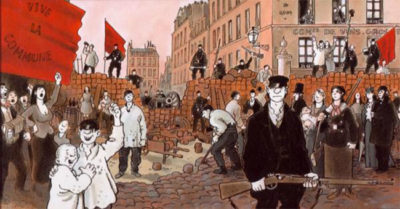Leftists talk a great deal about the term ‘working class.’ I even included it in my blog lexicon! In this post, I want to say a word about two terms related to all that – ‘proletarian’ and ‘worker.’ I think those terms reveal a great deal about the working class politics of the left.
I won’t exactly define those two terms in this post. But I will take some steps toward defining them. In particular, I’ll argue against using the terms interchangeably. Instead, I’ll suggest thinking about ‘proletarian’ as a subset of ‘worker.’ In doing so, I think we find new insights.
‘Proletarian’ and ‘Worker’
Let’s start with a couple of points about leftist theory. First, many leftists – especially those in Marxist circles – define ‘proletarian’ to refer to people capitalists hire to produce value for the company. They sell their labor-power, using it to produce that the capitalist sells for profit. Second, many of the same people use the term ‘worker’ interchangeably with the term ‘proletarian.’ In other words, they also use the term ‘worker’ to refer to a person who produces value.
And for Marx, this made sense. Marx lived during the time of the rise of the industrial economy. Capitalist companies made profit mostly by selling goods, and these parts of the economy were growing rapidly. Proletarians were therefore best positioned to lead working class movements. They did the work in the core area of the economy.
However, lots of people we would consider workers aren’t proletarians. That is to say, they work rank-and-file jobs and have bosses, but they don’t produce value. They make profits for capitalist enterprises in other ways. Companies now earn profits by manipulating money, using systems like Lean or Agile to manage their workers, and so on. Plus, as we’ve moved into a more financialized and post-industrial economy, these workers make up a larger share of the workforce. Especially in the parts of the economy growing rapidly.
In a society like ours, we should define ‘worker’ more broadly to include these other workers. Anyone who works a rank-and-file, front line job counts as a worker in a society like ours. We still have proletarians in the classical sense. But they’re a subset of workers. All proletarians are workers. Some workers are proletarians, but many are not. We should build leftist movements around workers, not just proletarians but all workers. Other workers produce profits, but not necessarily value.
Solving Problems
Thinking about ‘proletarian’ and ‘worker’ in this way helps us solve theoretical and historical problems for the left. As leftists, we know teachers and nurses stand at the forefront of union drives in the last decade. Silicon Valley capitalists and their state legislators attack these jobs and try to deskill the labor of teachers and nurses. Class politics center on these areas of the economy.
And yet it’s unclear to what extent teachers and nurses are proletarians. They certainly produce profits. They also engage in social reproduction, helping produce and maintain the working class itself. Teachers train the next generation of workers, and nurses maintain and restore the health of the current one. But their role with respect to the production of value is unclear, at best. They seem to produce profits in other ways.
And yet, most leftists see clearly that teachers and nurses are key to leftist movements. They work in growing parts of the economy, and they’re the focus of attacks from capitalists. However, they’re not proletarians in any clear sense. And so, we need a term other than ‘proletarian’ to describe their situation.
‘Worker’ does the job nicely.
Economic Transitions
The left has had to adjust its way of thinking from an industrial economy built on production to a more financialized and post-industrial economy built on money and services. As a part of this shift, we should distinguish between a narrower proletariat and a broader class of workers. It may not ever have been viable to focus only on proletarians, especially given that terms links to a class of industrial value producers. But it’s certainly not viable now.
And it’s not going to get any more viable in any plausible future.
Instead, the left has to put together a broad coalition of workers. It can’t ignore white-collar workers, for example. It can’t ignore service sector workers or any worker who produces profits without directly producing value.
A distinction like this one points us away from narrower productivist or workerist movements and toward a better conception of how to build class politics on the left. Hopefully this post helps us toward that aim.
